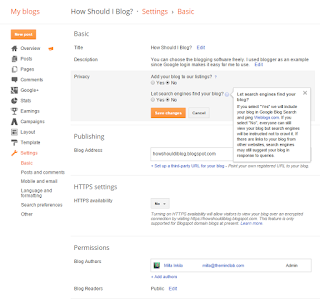Please note that there is an updated version of this blog post at
https://howshouldiblog.blogspot.com/2020/11/reflecting-publicly-or-privately.html- - -
We are hoping that your blog will be a public one, but if you prefer not to, there are other options that you can choose from, such as restricting the search engines to find it, limiting its readers (only those invited by emails can view) or using other privacy settings.
Different blogging platforms provide different privacy setting options. This is an example from Blogger:
Different blogging platforms provide different privacy setting options. This is an example from Blogger:
How to write about your learning journey publicly
This blog provides a view of your learning journey. It is about you reflecting upon your professional practice. You can think about your students and members of your community, but you should write about the topics in a manner that does not give away their identity. You shouldn't write anything you couldn't yell out in a bus.
Sharing is collaborating
Ryan Merkley, Chief Executive Officer of Creative Commons, suggests that collaboration, sharing, and co-operation are in our nature. During the first 24 weeks of our postgraduade programme it has been easy to see that building community, co-operating towards common goals and creating shared benefits are at the heart of who we are.Blogging anonymously
Anonymous blogging allows some people to be more honest than they might be if their real name were attached. You might have noticed that writing under a different name or alias allows some people to express different aspects of their personality, including parts that may not be appropriate to show at other times. But if there is no need to be anonymous, why would you? Why would you want to keep your learning journey and thought to yourself?
Having said that, you can also just hand in a (word/pdf) document of your learning tasks if you desire to do so. But if you make the effort to raise the discussion openly, we would certainly appreciate that.

Hi Milla
ReplyDeleteI have been writing a reflective blog since I started at MindLab. How do I separate that from the intended assignment for this blog?
Hi Nola. You don't need to separate the two if they seem a good fit. And probably they do! :) Just remember to hand in the required weekly posts, and that's it!
DeleteI have struggled with my reflective blog since we started in July and have not seen the benefit as did not really know how I was to use it. As a journal is was good but no one commented and/or I didn't ask questions for anyone to comment on. Others in the class used it as notes from each class. Not sure the difference between this and the community as a platform
ReplyDeleteHi hodge! I responded to your comment here: http://howshouldiblog.blogspot.co.nz/2016/01/how-to-save-copy-of-your-blog-posts.html Hopefully that helps!
DeleteThank you for your sharing.
ReplyDeleteMila I have setup a blog site Wordpress and made a pdf of it. How do I get this to publish to mindlab
ReplyDeleteI have have no idea how to put reflection 1
Hi Jo! All you need to do is to publish all those reflections on your own blog. And once it is time to submit them you save and upload those to the portal (all 4 at once). This post will explain it in more detail https://howshouldiblog.blogspot.com/2016/01/how-to-save-copy-of-your-blog-posts.html
Delete